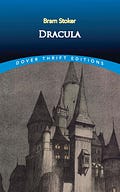If you are looking for the beginning of the study of Bram Stoker’s Dracula then you can go HERE for a brief introduction. At the bottom of the introduction you will find the links to each section of the study guide as it becomes available. If you would like to see the growing list of available book studies available for free on this site you can go HERE. Enjoy!
Virtues/Vices/Great Ideas: (Find them in the Text)
Fortitude, Doubt, Hope, Loyalty, Light vs. Darkness, Trust, Friendship, Truth
Grammar Questions: (The Information of the Text)
After reading Jonathan’s journal, what did Mina decide to with it’s content?
Who asked permission to come speak with Mina Harker and what about?
What “joke” did Mina play on her guest?
To what statement did Mina respond, “But, doctor, you praise me too much, and – and you do not know me.”
What did Mina pleadingly ask Van Helsing to do for Jonathan?
What did Mina request of Van Helsing before she told him all about Jonathan’s experience in Transylvania?
What did Jonathan say was the thing which had “knocked him over” and kept him from feeling totally like himself since his trip to Transylvania?
According to Dr. Seward’s diary, how is Arthur doing and who is with him?
Of the list of various things which Van Helsing asks Dr. John Seward whether he believes in them, which thing did he affirm?
According to Van Helsing, how did those children, reported upon by the Westminster Gazette, receive those wounds on their neck?
Logic Questions: (Interpreting, Comparing/Contrasting, Reasoning)
In writing Mina Harker’s second journal entry (24 Sept.) Bram Stoker frequently uses the ellipses (...). What is his purpose in doing so? How does this affect the tone of Mina’s journal entry?
Mina thinks that if Jonathan learns “for certain that his eyes and ears and brain did not deceive him, and that it is all true” it may help him to recover his confidence and wellbeing. Indeed her surmise turns out to be so, for later Jonathan says this knowledge “seems to have made a new man out of me.” Why would this be? Why would it be comforting to know that those horrors were real rather than imagined?
What did Mina mean when she wrote, “I suppose it is some of the taste of the original apple that remains still in our mouths?”
Why was Van Helsing so disposed to quickly become friends with Mina and Jonathan?
What are some examples that demonstrate the quality and character of Mina as a faithful and loving wife to Jonathan? List at least two things which demonstrate this.
What did Van Helsing mean when he said, “You are clever man, friend John; you reason well, and your wit is bold; but you are too prejudiced?”
How can Lucy, who is dead, be responsible for the harm that came to those children?
Rhetoric Questions: (The Analysis of Ideas in the Text)
In the classical writing exercises known as the progymnasmata one of the exercises is known as “Description,” wherein the author tries to accurately describe something, someone, or somewhere, in detail. Where do we see a good example of description in our present reading? What is the value of grasping the ability to give a good description? Give an example of where the use of this ability might be very valuable to others.
Van Helsing suggests that Dr. Seward is too closed off to possibilities which he has not seen with his own two eyes. How do we walk the careful line of being open to possibilities, yet unproven to us, without being a complete skeptic, while also not being gullible and too ready to believe anything and everything we hear? What is the proper balance of curiosity and openness versus skeptical and critical? How do we know if we are too far toward one direction or the other?
According to Van Helsing, one American defined faith as the ability “the faculty which enables us to believe things which we know to be untrue.” Is this a good or bad definition of faith? If it is good, why do you think so? If it is bad, what would be a better definition of faith? What makes your definition more accurate?
Theological Analysis: (Sola Scriptura)
Van Helsing told Mina, “My life is a barren and lonely one, and so full of work that I have not had much time for friendships.” How does Genesis 2 address the concept of loneliness? What does it tell us is needed for man to flourish?
Following up on the previous question, consider 1 Corinthians 12. What does this passage of Scripture teach us about the need for people to be together?


